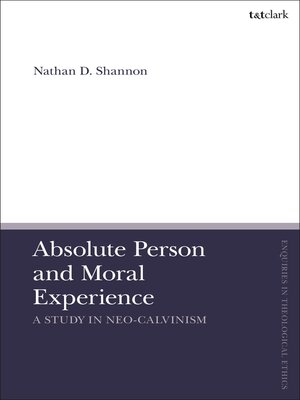Absolute Person and Moral Experience
ebook ∣ A Study in Neo-Calvinism · T&T Clark Enquiries in Theological Ethics
By Nathan D. Shannon

Sign up to save your library
With an OverDrive account, you can save your favorite libraries for at-a-glance information about availability. Find out more about OverDrive accounts.
Find this title in Libby, the library reading app by OverDrive.



Search for a digital library with this title
Title found at these libraries:
| Library Name | Distance |
|---|---|
| Loading... |
Presenting a neo-Calvinist account of human moral experience, this book is an advance upon the tradition of Augustinian moral theology.
The first two chapters are theological interpretations of Genesis 2:17 and 3:6 respectively. Chapter 3 approaches the neo-Calvinist notion of God as absolute person through a consideration of theologies of human reason and history. Chapter 4 considers the relationship between absolute person and classical trinitarianism, and the significance of absolute person for accommodation, hermeneutics, and the Creator/creature relation and distinction. The fifth chapter considers the role of the incarnation in Bavinck's thought, and thus provides a backdrop for reflection upon absolute person from a biblical theological point of view.
Shannon concludes with the claim that, according to the Bavincks, Vos, and Van Til, human moral experience is the product of a divine self-expression primarily in the Son.
The first two chapters are theological interpretations of Genesis 2:17 and 3:6 respectively. Chapter 3 approaches the neo-Calvinist notion of God as absolute person through a consideration of theologies of human reason and history. Chapter 4 considers the relationship between absolute person and classical trinitarianism, and the significance of absolute person for accommodation, hermeneutics, and the Creator/creature relation and distinction. The fifth chapter considers the role of the incarnation in Bavinck's thought, and thus provides a backdrop for reflection upon absolute person from a biblical theological point of view.
Shannon concludes with the claim that, according to the Bavincks, Vos, and Van Til, human moral experience is the product of a divine self-expression primarily in the Son.







